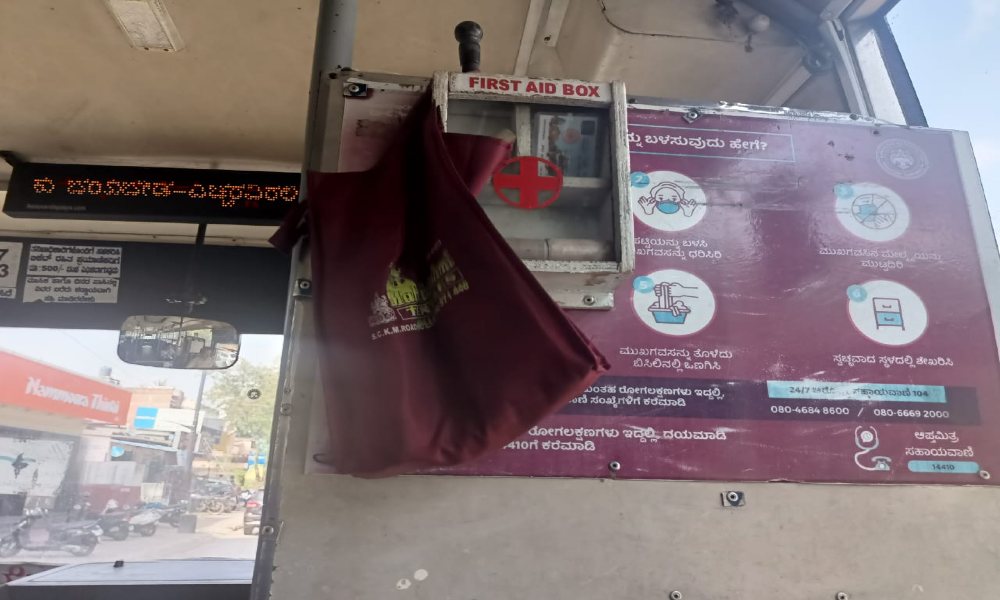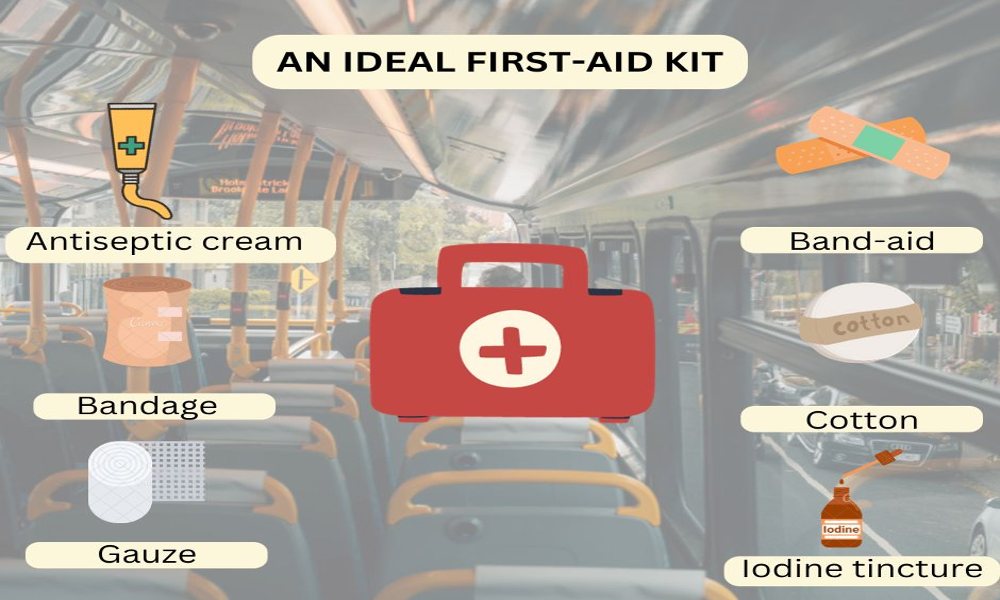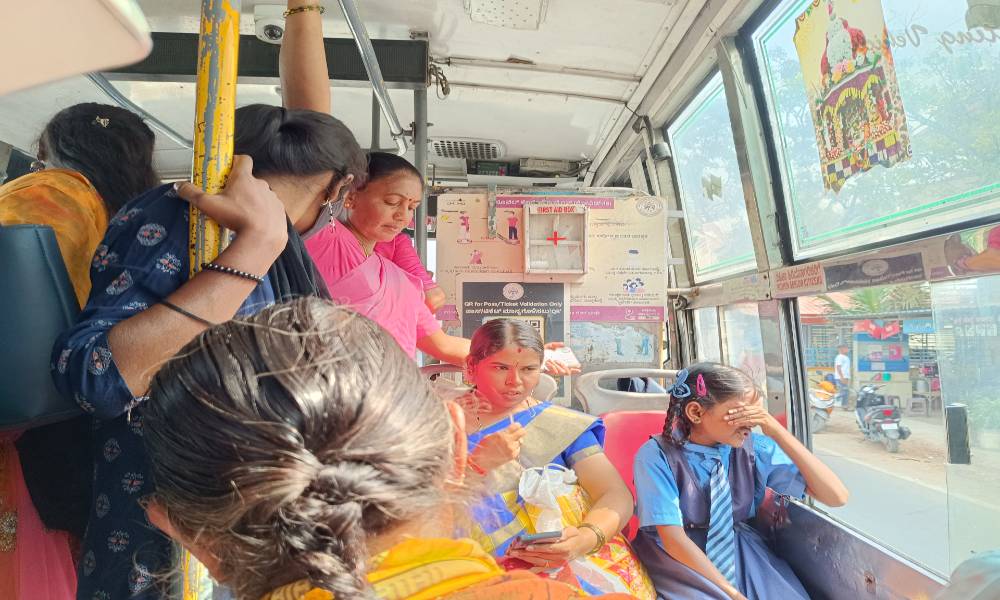To ensure passenger safety on buses, experts say that authorities must carry out regular inspections of onboard first-aid kits and train the staff to respond to emergencies.
Several Bengaluru Metropolitan Transport Corporation (BMTC) buses are operating without onboard first-aid kits in the city. This has left commuters without any safety provisions in case of an emergency.
Sahil, a college student who regularly relies on BMTC buses for his commute, said, “I have rarely come across first-aid kits on buses, despite their mention.” It is crucial for buses and all forms of public transport to have first-aid kits in case of emergencies, he said. “Travelling can pose various risks, ranging from minor scratches to more significant injuries, and it’s vital for citizens to have access to a readily available kit for such situations,” he added.
Padmapriya, a working professional, said that even when some buses do have partial contents in their first-aid kits, it can be inconvenient to request medicines from the conductor and administer them in a crowded environment. “Moreover, the deteriorated condition of the kit’s contents often discourages people from using them, as there’s a fear that the items may have expired,” she said.
Prashant, another working professional, said that injuries resulting from sudden braking or overcrowding are common occurrences during travel. In such situations, having an accessible first-aid kit with unexpired medications is highly desirable, he said. “Unfortunately, the staff may not always be adequately trained or may be occupied, leaving passengers to either administer first aid themselves or seek assistance from fellow passengers,” he added.

According to the Central Motor Vehicles Rules, 1989, all vehicles must carry a first-aid kit that contains antiseptic creams, dressings, plasters, and bandages. A BMTC official said that approximately 6,500 buses operate within the BMTC network, all of which should be equipped with first-aid kits. “While all buses are initially equipped with first-aid kits upon commissioning, over time, some of them either lose their kits or run short on the necessary medical supplies. But we do not have data regarding how many of these buses are currently lacking the kits,” she said.
Responsibility for ensuring the availability of first-aid kits and their contents onboard lies with the drivers and conductors, she said. “They must promptly report any missing first-aid kits or shortage of the stocked medical supplies,” she said. Additionally, any incidents related to the condition of these first-aid kits should be reported by the personnel responsible for the daily maintenance of the buses, she said. According to BMTC regulations, if a first-aid kit is found to be missing or incomplete, it should be restocked without delay, typically within a day or two. In cases where essential medical supplies are insufficient, tenders are floated to procure the required items, she added.
“The staff onboard the buses are also well-trained to administer first aid to passengers during emergencies. They undergo specialised first-aid training programmes as part of their regular training process,” she said. The first aid kits are provided for the safety and convenience of the public and are easily accessible to passengers, she said. “If needed, passengers can approach the conductor to access the kit’s contents,” she added.
Chandru, a bus driver, pointed out that the issue primarily lies with the older buses, as the newer ones are equipped with first-aid kits. “Also, some passengers do not return the medications after use, contributing to the problem of missing first-aid kits and medicines on buses,” he said.
He agreed that it is the responsibility of the driver, conductor, or the maintenance staff at the bus depot to report any missing first-aid kits or medications. “However, these checks are not conducted daily, and restocking of first-aid kits typically occurs during routine inspections or when the buses undergo fitness certificate tests,” he added.
Conductors are trained to provide first aid, and they are only deemed fit to take on their roles after completing the training programme, he said. “They are trained and are available to assist during emergencies,” he added.

Prof. M.N. Sreehari, Advisor to the Government of Karnataka for Traffic, Transportation, and Infrastructure, emphasised the crucial role of first-aid kits and well-trained staff in ensuring public transport safety during emergencies. “While first-aid only serves as the initial response in critical situations, it is important that such assistance is readily available,” he said.
To achieve this, the staff onboard the buses must receive not only initial training but also regular updates to maintain their readiness, he said. Additionally, their capability to respond effectively in emergencies should be periodically assessed and certified, he said. “Displaying certificates proving the fitness of the driver and conductor to respond to emergencies on the bus can instill confidence among commuters,” he added.
Furthermore, first-aid kits must be easily accessible and identifiable, marked with a green colour cross, which is the International Organization for Standardization (ISO) symbol for emergency and safety symbols, as opposed to the red cross, he said. “Regular checks are also necessary to ensure that the kit’s contents are not expired and remain suitable for use, as the use of expired products could prove counterproductive,” he said.
The public must be aware of their rights and the facilities available to them, and use the first-aid kit during emergencies, the BMTC official said. “Simultaneously, it is the responsibility of individuals to be responsible citizens and protect public assets by not misusing or damaging first-aid kits. After using any items from the kit, passengers should ensure that they are returned to the kit,” she added.
It is essential to raise awareness among the public about the availability of first-aid kits on buses and alter the perception that these kits are unfit for use, Sreehari said. “Similar to the inspection of the bus’s technical components before it departs in the morning from the depot, the first-aid kit and its contents should also undergo routine assessments,” he added.




